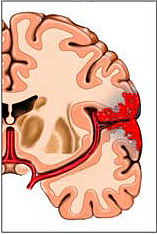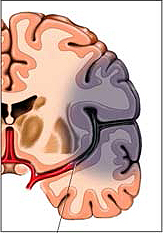Acute Stroke Unit |
B6
|
What is a Stroke?
What Is A Stroke?
A stroke occurs when the blood supply to part of the brain is cut off. When this happens, brain cells are damaged and begin to die, causing a variety of symptoms such as weakness or numbness down one side of the body, difficulty with speech (such as slurred speech or difficulty finding the correct words), or problems with vision.
There are two main causes of stroke. In 8 out of 10 cases, the problem is caused by a blood clot in one of the blood vessels supplying the brain. In the remaining cases, the problem is caused by bleeding into the brain due to a burst blood vessel.
Haemorrhagic Stroke Haemorrhage - Blood leaks into brain Tissue |
Ischaemic Stroke Clot stops blood supply to an area of the brain |
There is a related condition which is called a Transient Ischaemic Attack (sometimes called a"TIA" for short or a "mini stroke") where the interruption to the brain's blood supply is temporary, and symptoms are much shorter lived. TIAs are taken very seriously as they may be a warning sign of a future stroke if left untreated.
Stroke can affect patients of any age, although older patients are most often affected. A number of factors may predispose an individual to developing a stroke, including
- High blood pressure
- High cholesterol levels
- Smoking
- Diabetes
- Other family members affected by stroke
- Irregular heart beat (atrial fibrillation)
- High alcohol intake
- Being overweight
Strokes are usually diagnosed by a combination of a physical examination on arrival to hospital followed by a brain scan (either a CT or an MRI). Some patients with strokes caused by blood clots may be eligible for "clot busting" (thrombolysis) treatment if they arrive at hospital soon enough after their symptoms begin. Patients may go on to have a number of other tests during their hospital stay including scans of the neck and heart which can help to make plans for future treatments.

